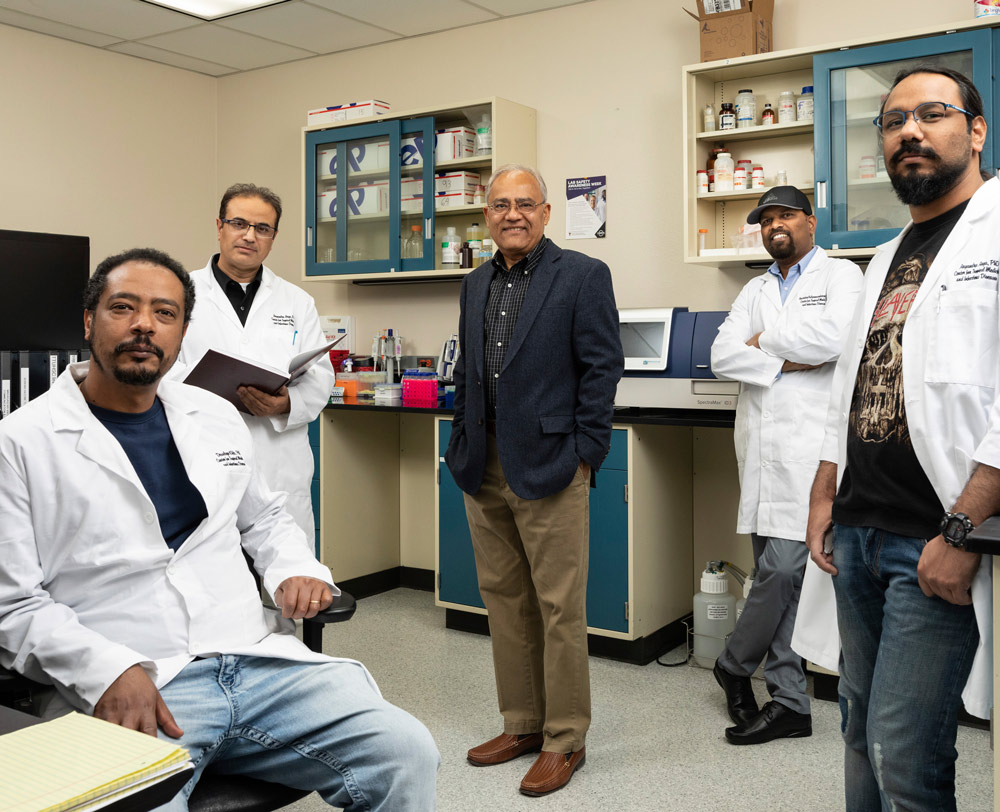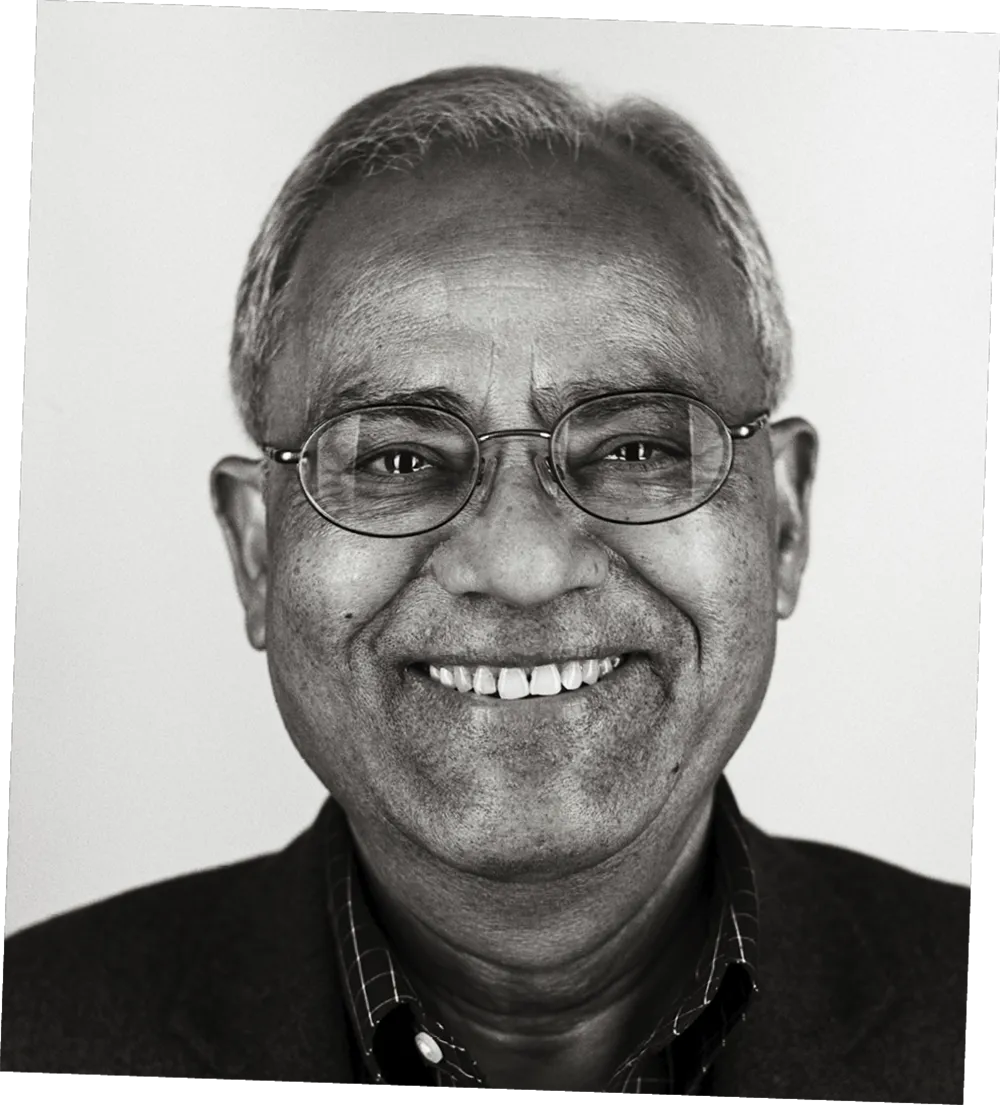 Feature
FeatureFamily Footsteps Put Siddiqui on Path to Vaccine Development
or most, preparing for a midnight-to-4 a.m. meeting is not part of the job description. To Afzal A. Siddiqui, PhD, such meetings are simply another stop along the decades-long path to deliver treatment — and hope — to approximately one billion people currently infected with or exposed to schistosomiasis.

Born and raised in India, Siddiqui witnessed firsthand the impact parasitic diseases can have on a population. He followed in his family’s footsteps to find a solution.
“I grew up in a family of academics; everybody was a professor, so that’s the only profession we knew growing up,” Siddiqui recalled. “And the reason I worked with parasites is because parasitic diseases are very common in India.”
After earning his PhD in zoology, Siddiqui’s journey to a schistosomiasis vaccine began in earnest in 1995 when he was hired by the late Steven Berk, MD, then chief of infectious diseases at East Tennessee State University.
When Berk moved to TTUHSC in 1999, Siddiqui joined him — first in Amarillo, where Berk served as regional dean for the School of Medicine, and then Lubbock in 2006, when Berk was named School of Medicine dean. Along the way, Siddiqui discovered a protein that would prove crucial to developing a viable schistosomiasis vaccine.
“I was able to conduct research on that one protein for many years, which is not that common,” Siddiqui pointed out. “So I was a lucky one because I was able to sustain my research funding on one protein.”
“Our data and our work have convinced the major funders in the world that this is something they would like to develop with us,” Siddiqui said. “It was a struggle to get the funding, but once we did, the progression was pretty smooth and fast.”
Most recently, Siddiqui and industry partner PAI Life Sciences, a Seattle-based company interested in neglected tropical diseases, completed Phase I trials in the U.S. Siddiqui said those given the vaccine during the Phase I trials experienced a very good response with no safety issues. However, Phase I trials must be completed in the country where the vaccine was developed before it can be tested in Africa, meaning the Phase I trial took place in the U.S. (Seattle) with a population not typically exposed to the schistosome parasite.
“We are seeing the same thing now in Africa: a very good immune response and no safety signals whatsoever,” Siddiqui said. “It is very early, but the trend appears to be the same.”
With the end of his vaccine development journey in sight, Siddiqui quickly credits those who have walked with him.
“I understood that I knew very little about developing vaccines, so I got people who do know,” Siddiqui said. “Our team is so complete; we have people who know how to produce a vaccine and people who know how to do the clinical trials in Africa. It is really a team effort with all of the players leading certain aspects of the vaccine’s development.”
Siddiqui attributes his success to his wife of 36 years who has been a pillar of support for him. He also noted the encouragement he received from Berk and Texas Tech University System Chancellor Tedd L. Mitchell, MD, who was TTUHSC’s president until 2019. Both were instrumental in building support for the project as a humanitarian effort.
“I’m not getting anything, and the university and the system aren’t getting anything regarding dollars,” Siddiqui added. “We just want to get the vaccine out so it can help. That’s what we would really like to see.”
– By Mark Hendricks
Evolution of the SchistoShield® Vaccine
2000: Siddiqui joins the staff at TTUHSC Amarillo as an associate professor after five years with East Tennessee State University.
2001: Secures funding from the National Institutes of Allergies and Infectious Disease at the National Institutes of Health. This support allows him to conduct bench studies and pre-clinical development of his schistosomiasis vaccine.
2014: The Bill & Melinda Gates Foundation funds to further study vaccine development.
2016: The U.S. patent office issues a patent for the schistosomiasis vaccine, SchistoShield®. Patents are also requested in India, China and Brazil.
2019: Siddiqui also becomes the first TTUHSC investigator to receive funding from the European Union’s Horizon 2020, the United Kingdom’s Wellcome Trust and South Korea’s RIGHT Foundation.
2022: Phase 1 trials of the vaccine begin in the United States, and then later in Madagascar and Burkina Faso in West Africa.
2024: Phase 2 trials are underway in Africa, with a market date goal of 10 years from the start of the first trial phase.

Excerpts from the CURRICULUM VITAE of
Afzal A. Siddiqui, PhD
EDUCATION:
Appointments:
PRESENT POSITIONS:
Publications, author credits, invited speaking events (as of March 2024):
- 83 peer-reviewed research articles
- 11 book chapters
- 117 invited speaking events
- 39 grants, journals, consultations and studies reviewed